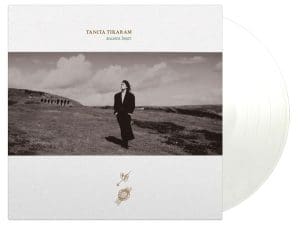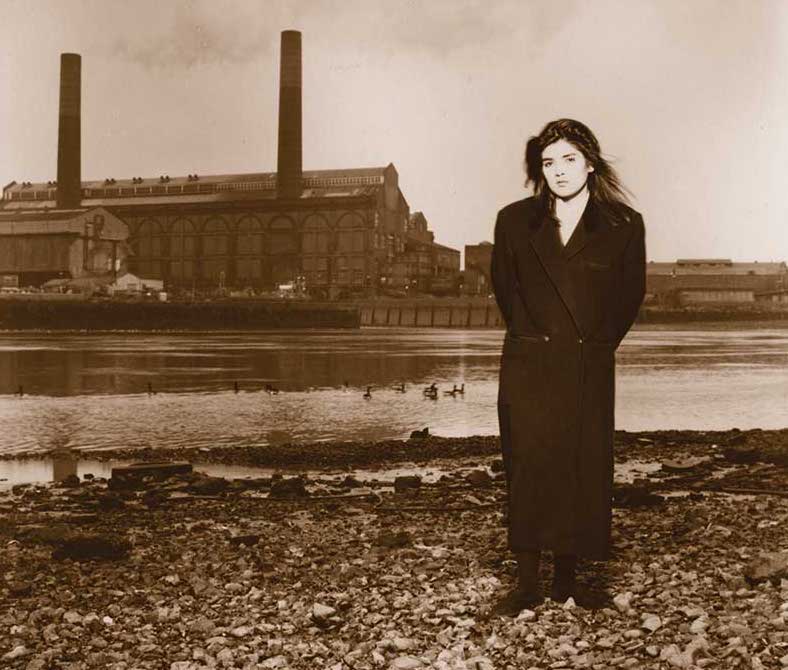
Tanita Tikaram became a brooding teenage superstar with her debut album Ancient Heart in 1988. Talking to us in 2018, the singer talked Classic Pop through a career that has seen her become everyone’s angel and encounter eleven kinds of loneliness… By Sean Egan
Winter 1988. Worming its way past the glistening profferings of Yazz, Kylie, Brother Beyond and Salt-N-Pepa was a single with an intriguing title and a snaking, oboe-tinged melody purred in an exquisitely androgynous voice by someone who, for good measure, visually resembled a distaff Elvis Presley.
Twist In My Sobriety was without question the most mysterious sound of the season. It is also pretty much a microcosm of Tanita Tikaram’s exotic and elusive career since.
Although her parents are of Bornean and Fijian extraction, Tikaram is suffused with Englishness, partly because she was a British Army brat, partly because her family settled in Basingstoke when she was 12. Being brought up adjacent to firing ranges, however, didn’t inhibit artistic impulses for either her or her brother (Ramon is a well-known actor). “I had always written songs from a young age: 10, 11, even younger,” she explains.
“I just thought it was normal. The serious part of writing songs probably started as a teenager.” Tikaram was attracted to the idea of the singer-songwriter because “that’s a very romantic figure.”
She cites Suzanne Vega, Joni Mitchell and Van Morrison as artists she was aware of. Luckily for her ambitions to join their ranks, it turned out that Tikaram could hold a note. She ratcheted up the effect of her husky voice by spurning her natural RP tones for something Dylanesque.
A certain matter-of-factness attended the way Tikaram landed a recording career. A single showcase performance at the Mean Fiddler in London had major labels knocking on her door, with WEA the company that won out. “When you’re young, you just think that’s what happens,” Tikaram shrugs.
She was, however, excited at being able to select a wish-list backing group that included Tom Waits guitarist Marc Ribot, Dexys Midnight Runners’ Helen O’Hara, Jackson Browne sideman David Lindley on violin and singer-songwriter Paul Brady on mandolin. Said musicians would deepen and widen the songs that would appear on her debut album.
Ancient Heart, unusually, had two producers, Peter Van Hooke and Zombies founder Rod Argent. “Between them, they had definite roles, though they worked all the time together,” she says. “They were the nicest people you could make your first record with. They were so excited about the process. It was a lovely summer.”

The album kicked off with Good Tradition, an uptempo track unrepresentative of the mellow vibe of what followed. “This is almost a throwaway, but it became a big song,” reflects Tikaram.
The music has a strong Celtic flavour courtesy of O’Hara, while the lyric addresses the warp and weft of family life. “No, it’s not about my family. At the time I was doing English A-level. We were reading Our Mutual Friend by Dickens and talking a lot about the family, the fireside and all this symbolism.”
Some fine classical guitar from Mitch Dalton embellishes Cathedral Song, of which Tanita Tikaram explains, “It’s about the enormity of love.” In retrospect, the composer wishes Sighing Innocents had the sort of spikiness associated with adolescence, its subject.
“This is a song that maybe I would have produced more roughly,” she says. Tikaram is almost embarrassed at the fact that people tell her how much I Love You means to them. “It’s a very imagined thing. I’ve never even seen the film Betty Blue, which I mention.” World Outside Your Window assumed an unexpectedly literal meaning.
Tikaram notes of British astronaut Helen Sharman: “She took this song with her.” The very title of the cinematic For All These Years suggests the reflectiveness of someone much older than Tikaram’s 19, something that could be said about much of the album. She reasons: “When you’re a teenager, you’re very open and you’re watching lots of interesting cinema, reading interesting books.” Mark Isham’s flugelhorn part completes the enigmatic soundscape.
Signature song
Twist In My Sobriety was the album’s second single. Although nothing like as successful as Good Tradition – reaching No.22 compared to the latter’s Top 10 chart placing – this suitably elliptical hymn to perplexity has wound up as Tikaram’s signature song. But what of the potentially dispiriting fact that, though she may have written better tracks, none will ever be as famous?
“I think you have to just accept your blessings. I heard recently Patti Smith singing the song. When you hear an artist of that stature singing one of your songs, you can’t really argue with that.”
Tikaram was puzzled by people assuming Poor Cow was a commentary on the namesake novel or film. “I hadn’t heard of that. It was just about being an awkward young woman who didn’t fit in with everybody.” She also says: “That’s my most Basingstoke song.”
He Likes The Sun is suffused with the soul and blues ingested from Tikaram’s father’s record collection. For around 10 startling seconds it explodes out of its somnambulant mood into uptempo rock. “Which was a headache for Rod and Pete,” Tikaram laughs as she recalls how such mismatching signatures hardly gelled with the rigid quantisation then fashionable in recording.
- Read more: Making Bjork’s Debut
Asked if she has ever wanted to do a whole album of uptempo rock, Tikaram’s response indicates that there are limits to her renowned musical adventurism. “Er, no.”
The beautifully orchestrated Valentine Heart is “a very romantic song,” says Tikaram, but adds, “the person in the song is solitary and imagining love.”
Of intense closer Preyed Upon, Tikaram points out: “I spent ages trying to work out whether to spell it ‘preyed’ or ‘prayed’.” She is convinced that the obsession with language bequeathed by being an English Lit student helped make her songwriting unusual. “When you are learning with a great teacher and you’re reading a lot, you have a sensitivity about language.”

Released in September 1988, Ancient Heart spent nearly a year on the UK album chart. As it proceeded to become a hit all around the world, it acquired the status of an easy-listening classic, or as Tikaram puts it: “In a certain moment in time, that record did make a very deep connection.” She also concedes, “You can’t look for that again.”
Her follow-up appeared unfussily quickly. “I don’t remember that being a difficult second album,” she says of The Sweet Keeper (1990). “At that period, I wrote very easily. I’m thankful that I was that naïve.” Although 1991’s Everybody’s Angel was the final LP utilising the same personnel and producers, Tikaram doesn’t see her opening trio as a self-contained section of her career. “Everybody’s Angel was slightly different because it really was more live,” she says.
- Read more: Top Kate Bush songs
By the time of the following year’s Eleven Kinds Of Loneliness, Tikaram had grown in confidence to the extent of producing the album herself. However, she is not sure it was a wise move. “It’s quite difficult to produce yourself ‘cos you don’t have any distance. I can say I like this particular sound, but I don’t know how to achieve it technically.”
Lovers In The City (1995) featured a coffee and cream vocal combination, with Jennifer Warnes’ backing vocals adorning almost half the tracks. Three years later, The Cappuccino Songs took Tikaram in a more electronica direction. This was a consequence of working with Marco Sabiu, a “keyboard wizard” Tikaram had met while recording a new song for her 1996 Best Of album. “Everything that you’re not, you’re actually fascinated by,” she explains.
All good people read good books
Her next two albums were released after gaps of seven years apiece. She spent the extended interregnums “hanging out, doing stuff, travelling… When you’re doing something from quite a young age, you just question why you do this. Then you come back to it, saying, ‘Oh, I know why I did this – ‘cos I love it.’”
Even so, turning 30 was a landmark that compelled Tikaram to learn a new instrument and mode of writing for 2005’s Sentimental. “I never had a great passion for the guitar,” she says. “It just happened to be the cheapest instrument when I was growing up. When I discovered the piano, it opened up my sound world.”
Having now proven herself via penning several acknowledged classics, Tikaram felt comfortable about sharing composing credit on the Americana-inflected Can’t Go Back in 2012. However, she is much too modest to put it in those terms, perhaps even to herself. “I feel as I get older it’s less about me being the artist and the songwriter… I have a much more idealistic view of music and I think it is about collaboration and working things out.”
Closer To The People (2016) also comprised co-writes and found her exploring yet further new territory following a reading of High Times, Hard Times by Anita O’Day: “It was her autobiography about the jazz life and the drugs and the insanity of being a singer.”
Tanita Tikaram is currently in the preparation stage for her next album, recording of which begins this month, with Helen O’Hara acting as ‘music director’. “I think it’s the most exciting thing I’ve done,” Tikaram says. Asked if it’s a change in direction, she responds: “Oh yeah!” and laughs uproariously, but then backtracks, before clamming up.
“This year I’m 50 so I just wanted to do an album that I absolutely don’t care what anyone thinks,” she offers. The half-century has provoked a reflectiveness that she states the 30th anniversary of Ancient Heart doesn’t. “Those songs are still quite close to me. They don’t seem 30 years ago. But becoming 50, that’s a big one.”
The former wunderkind is not apprehensive but excited about the milestone. “50 is the new 20,” she cheerily insists.
- Read more: Kate Bush in the 80s
- Want more from Classic Pop magazine? Get a free digital issue when you sign up to our newsletter!
The post Tanita Tikaram interview: For all these years appeared first on Classic Pop Magazine.





